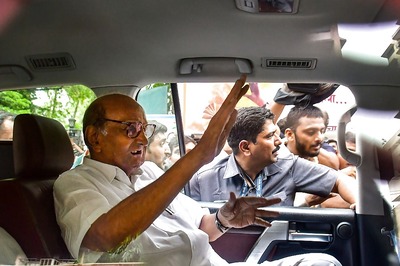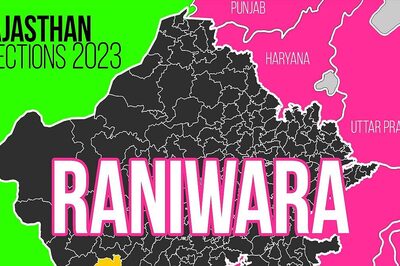
views
New Delhi: The BJP national executive on Saturday paid rich tributes to former prime minister Atal Bihari Vajpayee, saying in his death, the country had lost a visionary statesman, who led it by example and understood the importance of good governance for the foundation of value-based politics.
BJP president Amit Shah, in his speech, noted that this was the first meeting of the organisation's key body when its stalwart was no longer alive and said he was at a loss for words to describe the party's founder-president's contribution in building the organisation and to the nation.
Briefing reporters on Shah's address, Union minister Nirmala Sitharaman quoted the BJP chief as saying that Vajpayee worked as a "pure nationalist" in Parliament, and along with L K Advani, took the party from a low of two seats in the Lok Sabha to government formation.
Advani, a colleague of Vajpayee for over six decades, was present at the meeting. The executive also passed a condolence resolution remembering Vajpayee, who had attended its every meeting till failing health confined him to his residence for over a decade, before he died on August 16. This is the first BJP national executive meet after Vajpayee's demise.
"Atalji created a credible political alternative to satisfy the aspirations of the public. This became possible only because of his dedication and hard work. He could do all this because of his strong commitment to the core of his ideology," the resolution said.
The three-time former prime minister's political journey was one of constant struggle, facing innumerable challenges coming from adverse conditions, it added.
The obstacles were many and diverse, including "political untouchability" -- a reference to most political parties declining to ally with the saffron outfit over its alleged communal plank, before Vajpayee managed to win over many of them with his moderate credentials and affable personality — the resolution noted.
It said Vajpayee, along with BJP ideologue Deendayal Upadhyaya, not only succeeded in overcoming these challenges, but also gave a distinct identity to the party.
"He did everything with ease, right from cycling long distances to enrol and engage new party workers, to travelling pan-India for collection of donations for the party. He was equally apt in carrying out intellectual as well as organisational activities," it added.
Vajpayee was a man of many parts and besides being a thinker of the highest order, he was a talented poet, proficient writer and journalist, powerful orator and an excellent parliamentarian, the resolution said.
As prime minister, he set an example of his commitment and sensitivity and while in opposition, he presented an example of an ideal leader of opposition, it added.
Vajpayee established new examples of "coalition dharma" and demonstrated to the world how coalition politics could succeed in India, the resolution said.
The former prime minister was instrumental in laying the foundation of a new bonding between India and Israel and delivered the first address in Hindi as foreign minister in the UN General Assembly, instilling a sense of pride in every Indian, it added.
He was bestowed with an unmatched insight into politics, economic issues, public policy and governance in general and even on the issue of economic liberalisation and privatisation, he had ensured equilibrium by prioritising larger public interest, the resolution said.
Vajpayee's foresightedness resulted in a massive expansion and development of the highways and telecommunication networks, the resolution said, mentioning the "Golden Quadrangle" highway project and the "Pradhan Mantri Gramin Sadak" scheme to build rural roads when he was the prime minister between 1998 and 2004.
As prime minister he had made many significant and successful efforts to strengthen the good relations with our neighbours, while remaining steadfast and undeterred in successfully carrying out the historic Pokhran nuclear test, it said.
The creation of an independent ministry of Tribal Welfare was Vajpayee's initiative and for the "hitherto neglected north-eastern India", he had established a separate ministry, the resolution noted.
Vajpayee worked untiringly to create three new states — Chhattisgarh, Jharkhand and Uttarakhand — without any "friction", it said, adding that his contribution to the struggle against Emergency could not be forgotten.
"Students of democracy in India cannot forget that it was because of Atalji that a ceiling was introduced on the size of cabinets, both at the Union and state governments," the resolution said.
It added that it was Vajpayee who had introduced amendments to make the Rajya Sabha polls more transparent and free from corruption and the former prime minister had also attempted a serious review of the implementation of the Constitution.
"We will continue to tread tirelessly on the path laid by him and take forward the politics of good governance and development with full vigour," the resolution said.




















Comments
0 comment